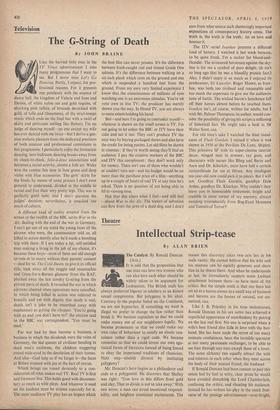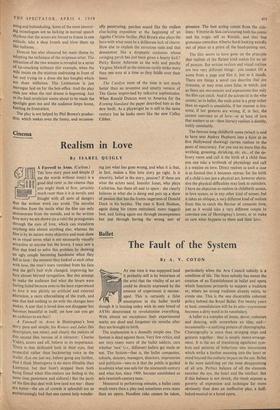Theatre
Intellectual Strip-tease
By ALAN BRIEN IIIIThe Catalyst. By Ronald Duncan. (Arts.) IT is odd that the proposition that ea, one man can love two women who can also love each other should be widely taken- to be argument for Lesbianism. The British male has always preferred bigamy to adultery as an honest sexual compromise. But polygamy is his' ideal. Contrary to the popular belief on the Continent, we are not hypocrites. If something we want is illegal we prefer to change the law rather than break it. We became capitalists so that we could make money out of our neighbours legally. We became protestants so that we could make our own rules of behaviour to, satisfy an elastic con- science rather than a rigid code. • We became romantics so that we could invent our own ego- tistical forms of literature instead of being forced to obey the impersonal traditions of classicism. Next step—abolish divorce by instituting polygamy?
Mr. Duncan's hero begins as a philanderer and ends as a polygamist. He discovers that Shelley was right: 'True love in this differs from gold and clay, That to divide is not to take away.' With two wives, a man can avoid emotional responsi- bility, and heighten emotional excitements. The reason this discovery takes two acts lies in his male vanity. He cannot believe that his wife and his mistress can be equally generous and share him as he shares them. And when he understands at last, he immediately suspects some Lesbian attachment between them—as have most of, the critics. But the simple truth is that our •hero has set up as a harem-owner in a small way of business and harems are the homes of natural, not un- natural, vice.
Like J. B. Priestley in his time melodramas, Ronald Duncan in his sex satire has achieved a superficial appearance of unorthodoxy by putting on the last reel first. No one is surprised when a wife's best friend also falls in love with the hus- band. She has been made the secret of too many intimate confidences, been the invisible spectator at too many passionate exchanges, to be able to see him through any eyes except those of a lover. The same alchemy can equally attract the wife and mistress to each other when they meet across the body- of their mutual friend, the husband. '
If Ronald Duncan had been content to peel this onion leaf by leaf in witty, clear prose he would have avoided disturbing the Lord Chamberlain, confusing the critics, and cheating his audience. Instead he has written his play in the mock free- verse of the prestige advertisement—over-bright, smug and buttonholing. Some of the most interest- ing monologues are so lacking in,normal speech rhythms that the actors are forced to freeze in one attitude, take a deep breath and blow them up like balloons.
Duncan has also obscured his main theme by adopting the technique of the striptease artist. The attraction of the two women is revealed in a series of lip-smacking tableaux (for example, when the wife insists on, the mistress undressing in front of her and trying on a dress she has bought) which are sheer titillation. The Lesbianism is just meringue laid on for the box-office. And the play ends just when the real drama is beginning. Just as the final revelation seems about to be made the spotlight goes out and the audience limps home, bottling its frustration.
The play is not helped by Phil Brown's produc- tion, which makes even the funny, and occasion- ally penetrating, patches sound like the endless clue-laying exposition at the beginning of an Agatha Christie thriller. Phil Brown also plays the hero with what must be a deliberate lack of charm. How else to explain the atrocious suits and that demeanour like a dyspeptic cockatoo whose swinging perch has just been given a hearty kick? Perky Renee Asherson as the wife and peachy Virginia Maskell as the mistress rarely strike more than one note at a time as they fiddle over their beau.
The Catalyst most of the time is not much better than an inventive and smutty version of The Game improvised by talkative sophisticates. When Ronald Duncan went to America for the Evening Standard the paper described him as the new Swift. As a playwright he is still in the same century but he looks more like the new Colley Cibber.































 Previous page
Previous page